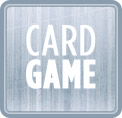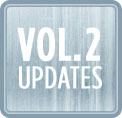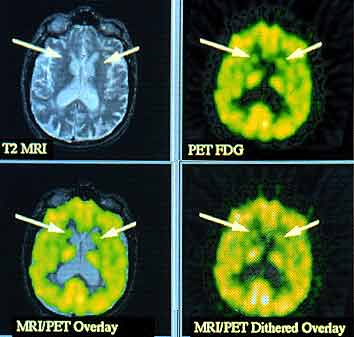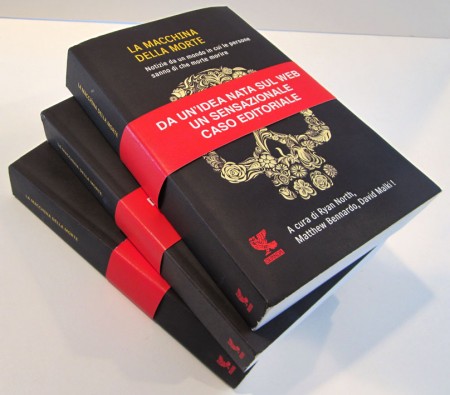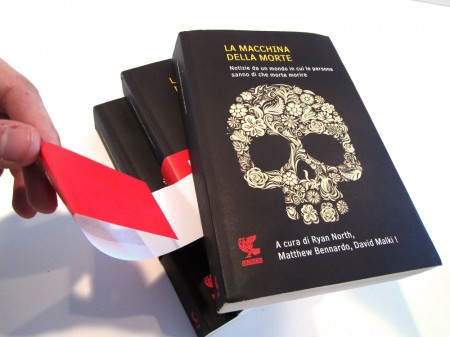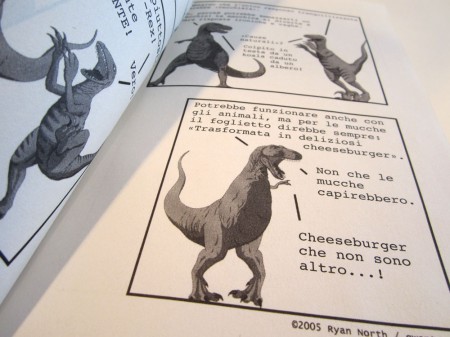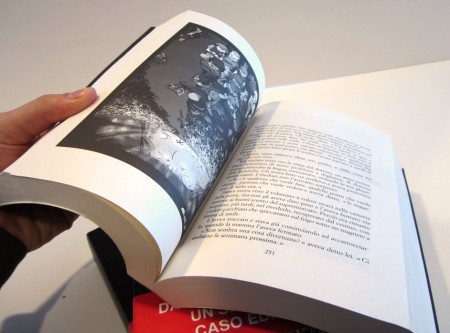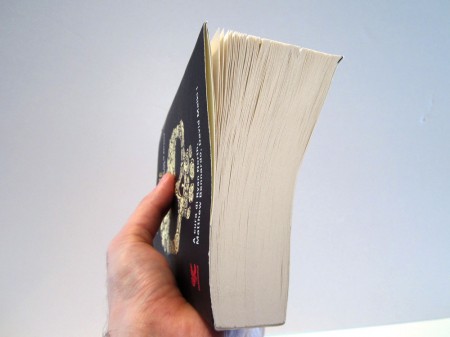Monthly ArchiveFebruary 2012
Links 27 Feb 2012 11:52 pm
‘Am I My Genes?’
“I have chosen not to be tested…it just seemed really — something I didn’t want to have to deal with. And if I was OK with it, I felt like the person that I would meet in my life, my husband, we talked about this before I was married.
“Now I am married, and I have a two-year-old son, and these are all things that every time we come to one of these decisions, it’s brought up again, and we decide again, you know, are we going to do it, no, I don’t want to do it. Are we OK with it? Yes, we’re OK with it…
“I have been able to be at peace with my decision, but I’ve seen my own sister, for whom not knowing put her into a severe depression for years.”
Machine of Death made real? Close — it’s modern-day genetic testing for diseases such as Huntington’s, as explored in a book by Robert L. Klitzman, M.D.: Am I My Genes?: Confronting Fate and Family Secrets in the Age of Genetic Testing. The above quote comes from an episode of NPR’s Talk of the Nation, in which the author is interviewed about the book.
More from Dr. Klitzman himself:
DONVAN [host]: So you test for this gene, and you come out positive. What do you then have to consider?
KLITZMAN: Well, there’s a wide range of issues, as you mentioned. The first one is whom do you tell. So people suddenly had to wrestle: Do I tell my 18-year-old son or daughter, or my 17-year-old, or my 21-year-old child that he or she therefore also has a 50-percent chance of having this mutation? Do I want to have that shadow them as they’re just getting going on their independent adult lives?
DONVAN: And what kind of answers did you hear to that question?
KLITZMAN: Well, people wrestled. People generally found, I think, that people at 17, 18 — that’s too young. Some people waited until their children were getting married, and suddenly when they were about to get married, at age 28, their parents said, ‘You know, by the way, Uncle Jack, he didn’t fall down the stairs and die as we talked about. He actually had Huntington’s disease.’ […]
DONVAN: Robert, is that quite typical, that it actually is kind of — the not knowing is more of a torment than knowing?
KLITZMAN: Well, it’s a very difficult decision because for some people, not knowing is worse, and therefore they decide to get tested. People, I should say, also often feel that they are beginning to have symptoms, and that then may lead them to decide to test or not test. There’s also issues during dating, that is to say, even before getting married. At what point do you tell? If you’re just beginning to date someone, do you tell right away on the first or second date? And if you do, there may not be a third date.
On the other hand, if you wait too long, people can feel you’ve not been honest. So those are very difficult decisions. […]
And the problem is if you tell the doctor, the doctor will no doubt write it in the medical chart, and if you apply for life insurance or disability insurance or long-term-care insurance, the insurance company may well ask to see the chart and see that information there…
[And] there is often subtle discrimination that goes on. So what people told me, as I describe in the book, is that, you know, ‘Everyone thought I would become the next head of the department when the head of the department retired. But I had this test, and I told a few people at work, or I told a work friend or colleague that I had this mutation, and when it came time to replace the boss, I was not chosen. I was passed over.’
The full interview is here. I heard this on the radio on the car and thought MOD fans might be as interested as I was. (Art imitating life, etc…?) The interview is well worth a listen!
There’s an excerpt from the book on the NPR website as well.
Updates 25 Feb 2012 01:51 am
Italian edition of MOD Volume 1
Hi everyone! Hope you’re well. We are — we’re just peachy. Everything has been very busy, but here’s a little update.
Last month, our first foreign edition was released, in Italy! It was published by Guanda, a pretty major Italian publisher. (Click any of the images for closer looks)
It’s gorgeous, folks. It’s simply amazing to imagine that a group of people half a world away took your book, thought about it, rendered it into their native language, designed and packaged it, and put it on sale. Their book looks nothing like ours, but it is ours!
Even down to the friendly postscript on the last page:
If you speak Italian, or know folks who do, or just want to own this amazing thing, you can get a copy of La Macchina Della Morte in either paperback or Kindle edition via Amazon.it.
Next is the German edition, due out in March, and I believe the Spanish edition is out in April.
What does this mean? It’s hard to say. All of this is mostly out of our hands at this point; we dearly hope that the books do well for those foreign publishers (and hopefully the recent frequency of Italian-language results in Google Alerts for MOD indicates that they are) — not only because it will expose new folks to the work, but it’ll also make those publishers more likely to pick up the translation rights for Volume 2 and future projects.
This is probably as clean an experiment as we’re likely to see judging how well MOD would have done with a traditional publisher. As best as I can tell, the foreign publishers we’re working with are big-name — for example, Heyne Verlag, the German publisher, is part of Random House — and so they’ll put as much (or little) promotion behind their editions as we could expect from anyone.
Still — how big are their print runs? What are their performance expectations, and were they overinflated by our strange initial success here in the States? How much will the book stand out without our own weirdo promotional machine behind it? How has the Italian version sold so far?
We don’t know the answers to any of these questions, nor, in all likelihood, will we ever. It’s a bit strange to be out of the loop, but at the same time, it’s kinda nice to not have the burden of responsibility either. Our contention all along has been that the work itself has enough merit to be worth the reader’s while, and we hope that will shine through, no matter what language it’s read in.
Contributors: We tried to exercise a clause in our contract that allowed us to buy discounted copies direct from the publisher, but were told that (a) that clause is never exercised and (b) the publisher doesn’t want to try to figure out how to deal with foreign credit cards. Kind of hilarious, actually. So if you’d like a copy, I think Amazon.it or the various publisher-recommended online shops might be your best choice, unless any Italians can recommend anything different.
Podcast Episodes 22 Feb 2012 09:02 pm
Podcast 29: HEAT DEATH OF THE UNIVERSE, by James Foreman
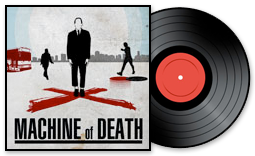
“HEAT DEATH OF THE UNIVERSE,” by James Foreman.
Read by Andrew Giordano. (43 min)
Maggie and I had the same doctor. He had a machine in his office that did the readings. He drew a little bit of blood and put it into a little receptacle on the machine. It looked like a big laser printer, smooth white plastic and blinking, green lights.
In a few minutes, the machine hummed and something inside it spun and the humming grew louder and shook the floor a little. He smiled at us, arms folded. The machine printed out the certificates on special paper, the same pinkish color as those new five-dollar bills.
He put them face-down on a tray and handed them to us. Maggie and I sat down on the examination table, butcher paper crinkling and creasing under us, bunching between us as Maggie scooted closer. The doctor left us alone.
Download the MP3 • Subscribe on iTunes
Direct podcast feed: http://feeds.feedburner.com/machineofpodcast
James Foreman lives in Pittsburgh and is probably drinking coffee. He blogs about his life’s esoterica at jamesforeman.com. This is him:
Andrew Giordano is a young actor from San Francisco. His training includes A.C.T., Jean Shelton Studios and Margie Haber Studios. These days, he’s always shooting his own content while also auditioning under Central Artists mgmt.
In the book, “HEAT DEATH OF THE UNIVERSE” is illustrated by Ramón Pérez. This podcast episode was edited by Matthew Schwartz.





